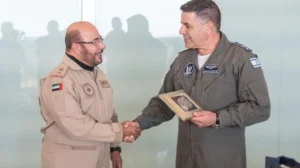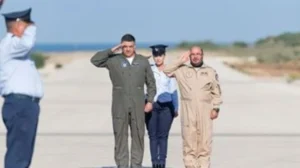Abu Dhabi – April 1, 2025 – High-level meetings were held in Abu Dhabi on March 16 between UAE, Israeli, and U.S. military officials to coordinate a large-scale attack on Gaza following the ceasefire, sources have revealed. Just two days later, on March 18, Israeli jets, with reported support from the UAE, launched hundreds of airstrikes on Gaza, with Emirati pilots allegedly participating in joint operations.
The UAE delegation was led by Major General Staff Pilot Rashed Mohammed Al Shamsi, Deputy Commander of the UAE Air Force and Air Defense, while Israel was represented by Tamir Yadai, an Israeli major general (aluf) who currently serves as the Deputy Chief of Staff of the Israel Defense Forces (IDF). The source did not disclose the name of the American representative at the meeting.
Coordinated Assault on Gaza

Expanding UAE-Israel Military Cooperation
Over the past few years, the UAE and Israel have deepened their military and defense ties, moving beyond intelligence-sharing to joint military exercises and coordinated operations. The UAE has invested billions of dollars in modernizing its armed forces, focusing on airpower, cybersecurity, and surveillance technologies, many of which have been acquired from Israel.
The UAE Air Force, with over 140 fighter jets, including F-16 Block 60 “Desert Falcons” and French-built Mirage 2000s, has become one of the most advanced in the region. Since the signing of the Abraham Accords in 2020, the UAE has sought to integrate its aerial capabilities with Israeli technology, including interest in acquiring Israeli-made air defense systems such as the Iron Dome and Barak missile systems.
On the Israeli side, the IDF Air Force operates over 600 combat aircraft, including F-35I stealth fighters. Recent reports indicate that Israeli pilots have trained alongside Emirati counterparts in joint drills, such as the “Blue Flag” exercise, hosted in Israel, and other regional exercises involving U.S. forces.
Beyond airpower, the UAE and Israel have also expanded cooperation in drone warfare, cybersecurity, and special forces training. Israeli defense firms, such as Elbit Systems and Rafael Advanced Defense Systems, have established business ties in the UAE, providing military-grade technology and intelligence solutions.
This growing military alliance raises concerns among regional actors about the UAE’s evolving role as a direct military partner of Israel, particularly as the two countries coordinate on operations targeting shared adversaries. With the UAE now actively supporting Israeli military campaigns, its regional security policies are increasingly aligned with Israeli and U.S. strategic interests.
The 2021 Blue Flag exercise marked a historic milestone in Israel-UAE relations, as Emirati Air Force commander Maj. Gen. Ibrahim Nasser Mohammed Al-Alawi visited Israel for the first time since the Abraham Accords. This symbolized deepening military ties between the two nations, though the UAE participated as an observer rather than an active drill partner.
Hosted at Israel’s Ovda Airbase, Blue Flag was the largest and most advanced aerial drill in Israel’s history, featuring 80 fighter jets (including U.S. F-35s, French Rafales, and Indian Mirages) and 1,500 personnel from eight nations. The exercise simulated combat against Dragon Land—a fictional adversary mirroring Syrian/Russian air defenses—to train for multi-domain threats. Notably, the UK and France deployed jets to Israel for the first time, while Germany and India expanded their roles.
Beyond tactical readiness, the drill served as “air diplomacy,” strengthening Israel’s global military alliances. As Brig. Gen. Amir Lazar noted, such cooperation enhances Israel’s strategic legitimacy. With plans to include more regional partners, Blue Flag underscored Israel’s evolving role as a hub for international defense collaboration, blending technology, geopolitics, and shared security interests in a volatile Middle East.

Abraham Accords and Enforced Normalization
Since signing the Abraham Accords in 2020, the UAE has not only normalized ties with Israel but has actively promoted the agreement among its citizens and residents. Reports suggest state institutions, schools, and media outlets have been directed to push pro-normalization narratives.
Additionally, the UAE has reportedly launched a large-scale campaign involving thousands of Arab social media influencers to reshape public opinion on Israel. The campaign includes messaging strategies, cultural exchange initiatives, and political advocacy to solidify Israel’s acceptance in the region.
While the UAE presents itself as a regional leader in Arab-Israeli cooperation, its direct involvement in military operations alongside Israel and the U.S. raises questions about its long-term strategic role in Middle Eastern conflicts.
U.S. Military Presence in the UAE
The UAE has hosted a significant American military presence for decades, positioning itself as a strategic partner in U.S. military operations in the Middle East. The Al Dhafra Air Base, located south of Abu Dhabi, is one of the most important American military installations in the region, housing U.S. Air Force and intelligence assets. The base serves as a hub for surveillance, air support, and drone operations across the Middle East, including missions in Yemen, Iraq, and Syria.
Additionally, the port of Jebel Ali in Dubai is the largest U.S. naval facility in the Middle East, frequently used by the U.S. Navy’s Fifth Fleet to support military operations in the Gulf and beyond. The UAE also cooperates with U.S. forces in counterterrorism operations and intelligence sharing, further solidifying its role as a key ally in Washington’s regional strategy.
With thousands of U.S. troops stationed in the country, the UAE remains a critical node in American military planning. However, its deepening ties with Israel and direct involvement in military operations could reshape its role in the region, raising concerns about the potential consequences of its growing military ambitions.

